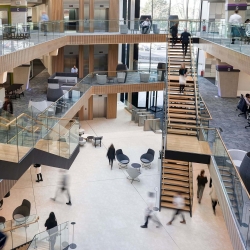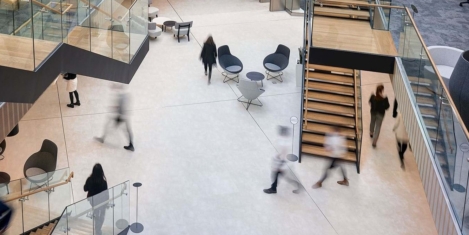April 29, 2020
Search Results for: future of work
April 16, 2020
Isolation and stress from pandemic have profound mental health impact
by Neil Franklin • News
 The effects of isolation and stress from the coronavirus pandemic could be having an extremely profound effect on people’s physical mental health – now and in the future, say a group of prominent psychiatrists and psychologists writing in the The Lancet Psychiatry journal. (more…)
The effects of isolation and stress from the coronavirus pandemic could be having an extremely profound effect on people’s physical mental health – now and in the future, say a group of prominent psychiatrists and psychologists writing in the The Lancet Psychiatry journal. (more…)
April 13, 2020
Sleeping habits improve under lockdown, but conspiracy theories abound
by Neil Franklin • News, Wellbeing
 One of the surprising consequences of the current lockdown for many people is that they are sleeping more soundly. A new study claims that nearly two thirds of people are getting the same amount or more sleep than they were before the UK went into lockdown on March 23rd. However the report also uncovered some troubling attitudes amongst groups of people, even though the majority are informed and behaving as advised. (more…)
One of the surprising consequences of the current lockdown for many people is that they are sleeping more soundly. A new study claims that nearly two thirds of people are getting the same amount or more sleep than they were before the UK went into lockdown on March 23rd. However the report also uncovered some troubling attitudes amongst groups of people, even though the majority are informed and behaving as advised. (more…)
April 7, 2020
Firms with strong DNA tend to have a strong immune system
by Mieke Jacobs and Paul Zonneveld • Features
 Mergers & acquisitions should always lead to a cultural identity shift. This can range from a complete reinvention of identity and purpose to just a slight shift that includes the new partner: its history, narrative and critical traits. (more…)
Mergers & acquisitions should always lead to a cultural identity shift. This can range from a complete reinvention of identity and purpose to just a slight shift that includes the new partner: its history, narrative and critical traits. (more…)
April 1, 2020
A revolutionary new approach to design and fit-out for flexible offices
by Freddie Steele • Company news, Workplace design
 Innovation in the commercial property market is the driving force behind a revolutionary new approach to the design and fit-out of office space from Modus. Tenant-Ready is a solution aimed at both landlords and operators, to deliver pre-fitted or fitted-to-demand workspace specifically for coworking spaces, serviced offices and other forms of flexible workplaces in which fit-out is not procured by tenants and occupiers. (more…)
Innovation in the commercial property market is the driving force behind a revolutionary new approach to the design and fit-out of office space from Modus. Tenant-Ready is a solution aimed at both landlords and operators, to deliver pre-fitted or fitted-to-demand workspace specifically for coworking spaces, serviced offices and other forms of flexible workplaces in which fit-out is not procured by tenants and occupiers. (more…)
March 30, 2020
New task force to reduce health burden of COVID-19
by Jayne Smith • News

The International WELL Building Institute (IWBI) has announced that it is setting up a task force to reduce the enormous health burden from COVID-19 and other respiratory infections. Its goal is to define the critical role buildings, organisations and communities play in prevention and preparedness, resilience and recovery. The task force’s work will take a broad approach, considering both new and recurring infectious agents that can affect large populations. (more…)
March 25, 2020
Have your say on the coronavirus pandemic
by Jayne Smith • Knowledge, News, Wellbeing
 One of the first research projects aimed at gauging the UK public’s attitude and responses to the coronavirus pandemic is being launched. Experts at Cardiff University and Cardiff Metropolitan University are urging people from across the UK to take part in a survey to assess how people feel about – and how they are responding to – one of the biggest health crises facing the country in recent history. (more…)
One of the first research projects aimed at gauging the UK public’s attitude and responses to the coronavirus pandemic is being launched. Experts at Cardiff University and Cardiff Metropolitan University are urging people from across the UK to take part in a survey to assess how people feel about – and how they are responding to – one of the biggest health crises facing the country in recent history. (more…)
March 19, 2020
Will coronavirus mean the death of the office?
by Mark Eltringham • Comment
 Betteridge’s law of headlines declares that “Any headline that ends in a question mark can be answered by the word no”. And so I simultaneously ask and answer the question of whether the coronavirus pandemic will really lead to the death of the office. So it goes. Of course, I’m not the first person to raise the question over the last few weeks as the world adapts to the threat of the pandemic. But it’s worth reminding ourselves that the demise of the office has been predicted for at least a quarter of a century, although never in such circumstances. (more…)
Betteridge’s law of headlines declares that “Any headline that ends in a question mark can be answered by the word no”. And so I simultaneously ask and answer the question of whether the coronavirus pandemic will really lead to the death of the office. So it goes. Of course, I’m not the first person to raise the question over the last few weeks as the world adapts to the threat of the pandemic. But it’s worth reminding ourselves that the demise of the office has been predicted for at least a quarter of a century, although never in such circumstances. (more…)
March 18, 2020
The UK`s tech sector continues to thrive
by Neil Franklin • News, Technology
 Britain’s digital sector is growing at six times the pace of the country’s other industries, according to new research from Tech Nation. According to the annual study, technology businesses contributed around £149 billion to the UK economy in 2018, nearly 8 percent of GDP. Since 2017 staff numbers at digital companies have risen by 40 percent to 2.9 million, nearly tenth of the total UK workforce. (more…)
Britain’s digital sector is growing at six times the pace of the country’s other industries, according to new research from Tech Nation. According to the annual study, technology businesses contributed around £149 billion to the UK economy in 2018, nearly 8 percent of GDP. Since 2017 staff numbers at digital companies have risen by 40 percent to 2.9 million, nearly tenth of the total UK workforce. (more…)
March 17, 2020
Government launches “revolutionary” green transport consultation
by Neil Franklin • Environment, News, Technology
 The government has launched a new intiative to test the introduction of green transport systems and also injected £90 million into funding three experimental ‘future transport zones’ across the UK aimed at establishing whether smart and green technology can be adopted. The new transport zones in the West of England, Portsmouth and Southampton and the East Midlands will be used to test innovations in the movement of people and goods. One project will trial the use of drones for carrying medical supplies from clinics in the Isle of Wight to hospitals in the mainland. This should cut down the time spent moving supplies by ferry or road while speeding up diagnosis. (more…)
The government has launched a new intiative to test the introduction of green transport systems and also injected £90 million into funding three experimental ‘future transport zones’ across the UK aimed at establishing whether smart and green technology can be adopted. The new transport zones in the West of England, Portsmouth and Southampton and the East Midlands will be used to test innovations in the movement of people and goods. One project will trial the use of drones for carrying medical supplies from clinics in the Isle of Wight to hospitals in the mainland. This should cut down the time spent moving supplies by ferry or road while speeding up diagnosis. (more…)
March 6, 2020
Smart cities will be defined by a number of key characteristics
by Neil Franklin • Cities, News, Technology
 The future infrastructure of smart cities will rely on the analysis of data relayed by the sensors in buildings, infrastructure, transportation and power grids; enabling city authorities to make critical decisions in real-time, according to GlobalData’s latest report, ‘Smart cities – Thematic Research’ (paywall). (more…)
The future infrastructure of smart cities will rely on the analysis of data relayed by the sensors in buildings, infrastructure, transportation and power grids; enabling city authorities to make critical decisions in real-time, according to GlobalData’s latest report, ‘Smart cities – Thematic Research’ (paywall). (more…)



























April 8, 2020
Finance leaders gear up for life after lockdown
by Stephen Norris • Comment, Property